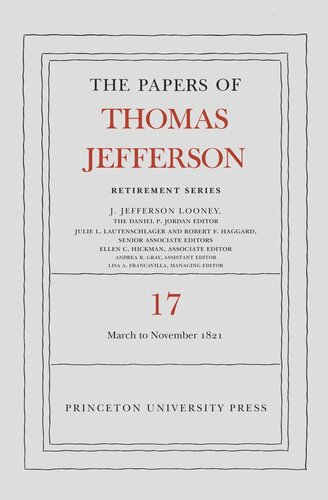

Most ebook files are in PDF format, so you can easily read them using various software such as Foxit Reader or directly on the Google Chrome browser.
Some ebook files are released by publishers in other formats such as .awz, .mobi, .epub, .fb2, etc. You may need to install specific software to read these formats on mobile/PC, such as Calibre.
Please read the tutorial at this link: https://ebookbell.com/faq
We offer FREE conversion to the popular formats you request; however, this may take some time. Therefore, right after payment, please email us, and we will try to provide the service as quickly as possible.
For some exceptional file formats or broken links (if any), please refrain from opening any disputes. Instead, email us first, and we will try to assist within a maximum of 6 hours.
EbookBell Team

5.0
50 reviewsA definitive scholarly edition of the retirement papers of Thomas Jefferson
The 612 documents in this volume include Jefferson’s notes on his early career, one of the lengthiest papers of his retirement. Often misleadingly called his autobiography, the text describes Jefferson’s experience as an American revolutionary, a legislator shaping and revising Virginia’s laws, and a United States diplomat in France as its own revolution neared.
Jefferson sits for a portrait by Thomas Sully commissioned for West Point. He takes the unusual step of allowing his recommendation of a book by John Taylor to be published, insuring a wide circulation of Jefferson’s views on the proper balance between state and federal powers, and in a private letter he asserts that the federal judiciary is amassing overarching power, “ever acting, with noiseless foot, & unalarming advance, gaining ground step by step, and holding what it gains.” Jefferson receives a description of an African American commemoration of the nation’s 1807 ban on the importation of slaves.
Jefferson advises that the opening of the University of Virginia is not imminent even as he oversees its construction and defends the high cost, stating as his goal, “to do, not what was to perish with ourselves, but what would remain, be respected and preserved thro’ other ages.”